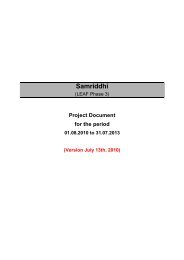Coorperation Strategy - Albania 2010-2013 - Deza - CH
Coorperation Strategy - Albania 2010-2013 - Deza - CH
Coorperation Strategy - Albania 2010-2013 - Deza - CH
You also want an ePaper? Increase the reach of your titles
YUMPU automatically turns print PDFs into web optimized ePapers that Google loves.
SWISS COOPERATION<br />
5 % of the overall donor contribution), Swiss Cooperation<br />
plays a prominent role as a result of its<br />
long-term presence and continuous engagement<br />
in support of democratisation and decentralisation<br />
as well as in infrastructure and private sector<br />
development. Switzerland has the opportunity in<br />
<strong>Albania</strong> to add specific value by sharing its particular<br />
national experience and practice in key<br />
reforms such as decentralisation, regional development,<br />
Vocational Education and Training (VET),<br />
energy (mainly hydropower), and risk insurance<br />
by means of cooperation programmes and projects.<br />
The Government of <strong>Albania</strong> actively promotes<br />
the Paris Declaration for an enhanced alignment<br />
of donors. Switzerland aligns its strategy with<br />
the NSDI and with the national sector strategies.<br />
ing; promoting equal access of women to political<br />
decision-making and to economic opportunities;<br />
the inclusion of all marginalised groups, especially<br />
Roma; and reforming education and health care<br />
systems. An overall challenge remains the reduction<br />
of the widening gap between rural and urban<br />
development.<br />
By building upon existing potentials and addressing<br />
challenges, Switzerland will continue its support<br />
to <strong>Albania</strong>’s ongoing process of strengthening<br />
the private and public sectors, the economy<br />
and civil society.<br />
1.5 Potentials<br />
The EU integration will remain the major driving<br />
force for <strong>Albania</strong>’s transition process over the coming<br />
years 6. This follows the successful NATO accession<br />
in 2009. The EU accession process is increasing<br />
the political stability and provides a basis for<br />
a systematic building-up of institutions and civil<br />
society organisations. The pursuance of the reform<br />
process in alignment with the NSDI and the sector<br />
strategies enhances the country’s competitiveness<br />
and contributes to its economic development. The<br />
country’s strategic framework also constitutes an<br />
important tool for alignment with official development<br />
assistance and for donor harmonisation.<br />
1.6 Challenges<br />
<strong>Albania</strong>’s challenge is to reach the relatively demanding<br />
EU standards.<br />
Political challenges: strengthening democratisation,<br />
including the promotion and protection of<br />
citizen’s rights; decentralisation with a view to<br />
having an effective and efficient, democratically<br />
functioning administration; de-politicisation of the<br />
administration in order to reduce the high turnover<br />
of governmental staff which severely impedes efforts<br />
of long-term governmental ownership.<br />
Economic challenges: maintaining positive<br />
growth trends in times of global crises; increasing<br />
and sustaining the competitiveness of <strong>Albania</strong>n<br />
enterprises; and improving basic infrastructure,<br />
while confirming the government’s vision of increased<br />
private sector participation in this area.<br />
Social challenges: strengthening civil society<br />
and NGO performance through capacity build-<br />
8<br />
6<br />
On 28 April 2009, <strong>Albania</strong> officially applied for<br />
EU Candidature Status.

















